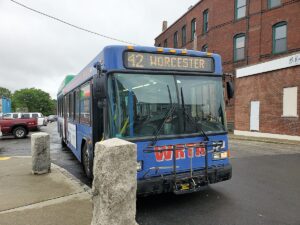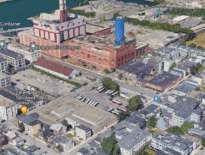
A Worcester Regional Transit Authority bus lays over in this file photo. Photo by Pi.1415926535 | CC BY-SA 4.0
Just about two months before the first few dollars in extra income tax will begin to trickle into state coffers, the Legislative Regional Transit Authority Caucus is joining other transportation and education advocates in positioning their priorities to receive those funds.
The state’s new surtax on household income above $1 million is expected to generate about $1 billion in revenue for transportation and education purposes in fiscal year 2024, but since the ballot question creating the surtax passed in November, education advocates have been most active in rolling out specific ideas for how to spend those dollars.
In its first meeting of the session Tuesday, the RTA Caucus made its first pitch for “making sure we get our fair share of the Fair Share funding,” said caucus House co-chair Rep. Sarah Peake of Provincetown.
“It has to be a priority of the caucus to make sure that we have a seat at the table,” Peake said.
Among its legislative goals this year is a bill to set the floor for state contract assistance to RTAs at $150 million to allow all agencies to provide daily and evening service, and to create an RTA Fund mirroring the MBTA Fund for investments in regional transit (HD.2385 / SD.1762).
Caucus member Rep. David LeBoeuf also highlighted two bills he filed to electrify RTAs (HD.2553 / SD.1370) and start a fare-free bus pilot program in one MBTA community and one RTA community (HD.1042 / SD.1186).
“We’re going to see those dollars be needed 15 different ways, and there’s really only funding for 10 of those to be funded,” Peake said.
The first quarterly payments affected by the new surtax are due in April, but lawmakers have not yet committed to how they will divide the revenue between education and transportation investments.
On the education side, advocates are vying for doubling financial aid for public higher ed, investments in early childhood care and schooling, and increasing the base cost of living adjustments on which teachers’ pensions are calculated.
After education investments have been carved out of the total revenue pot, there are still a “variety of needs” in transportation that could be addressed with surtax revenue, Peake said.
“There’s going to be a lot of focus, and rightfully so, on the T – getting those Orange Line trains built so that they can stay on the rails for more than two weeks before they have to pull them off again, getting the schedule back on track,” Peake said. “I see it with my own eyes what the problems are within the T. However, transportation is more than the MBTA.”
The Provincetown Democrat also said she would like to see some of the money go to the Cape Cod bridges, which have now been denied two grants from the federal government for replacement.
The latest application to replace the Bourne and Sagamore bridges sought $1.88 billion of the total $3.98 billion project cost (about four years’ worth of 100 percent of the funds expected from the income surtax.) With two federal grants denied, MassDOT spokesperson Jacquelyn Goddard said the transportation department would “continue to pursue every possible avenue” to “secure federal discretionary funds to replace the bridges,” but have so far not made any public announcement that they are looking to use surtax revenue for the project.
Though the bridges and MBTA have been the focus of attention recently, residents all over the state count on regional transit services to get to jobs, school and medical appointments.
“The RTAs provide essential service and they connect riders in over 250 cities and towns beyond the reach of the MBTA,” caucus House co-chair Rep. Natalie Blais of Deerfield said. “They help with access to food, jobs, youth development and so much more. But they’ve been chronically underfunded and they’ve had limited support.”






